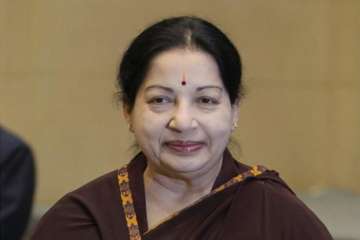Chennai: Tamil Nadu Chief Minister J Jayalalithaa has asked the Centre to ensure that the common entrance exam NEET for MBBS and dental courses is "not forced" on it even in the future as its implementation would "nullify" certain policy initiatives and socio-economic objective of the state.
While thanking Prime Minister Narendra Modi for "speedy promulgation" of an ordinance yesterday, providing exemption from NEET this academic year, she said, "For the time being, it put at rest the mental agony, stress and anxiety of lakhs of students and their parents aspiring for medical admission for the current year in the state quota."
In a letter to Modi on Tuesday, Jayalalithaa said although the ordinance would temporarily address the issue for the current year, Tamil Nadu's "situation is distinct and different from other states."
She recalled that her government had taken a number of steps since 2005 for systematising admission process to medical seats, even abolishing entrance exams by way of a legislation which she said was even upheld by the Court.
"This measure was taken keeping in view the interests of students, particularly from the weaker sections and rural areas, to ensure that a level playing field is created."
"Introduction of NEET would be a direct infringement on the rights of the State and would cause grave injustice to the students of Tamil Nadu who have already been covered by a fair and transparent admission policy laid down by the Government of Tamil Nadu, which has been working well," she said.
Jayalalithaa urged Modi that necessary measures be taken to ensure that Tamil Nadu was permitted to "continue (with) its existing fair and transparent system of admission to medical colleges and dental colleges in the state and not forced to implement the NEET even in the future."
Rural students and those from poorer socio-economic backgrounds will be unable to compete with urban elite students in such Common Entrance Examinations, which were designed to favour the urban elite, she said.
Jayalalithaa said rural students will be put to great disadvantage because they lack the resources to enrol in training institutions and access materials available to urban students, she said, adding, a large number of socially and economically backward meritorious rural students had benefited by the state Government's decision to abolish entrance exam.
Further, for admission to Postgraduate medical courses, Tamil Nadu government gave preference to those who had served in rural areas, with special weightage for those working in hilly and tribal areas, she said.
"The State Government has also successfully obtained and enforced bonds from those completing Postgraduate education in Government Medical Colleges to serve the state government for a minimum period, which has helped us to meet the need for specialist medical manpower in Government Hospitals."
"Introduction of NEET would nullify the implementation of these policy initiatives and socio-economic objectives of the State, as the regulations for a National Test may not have such enabling provisions. The national test is out of tune with the prevailing socio-economic milieu and administrative requirements of Tamil Nadu," she said.
